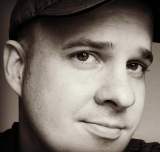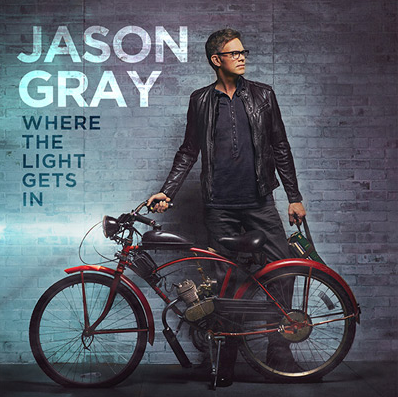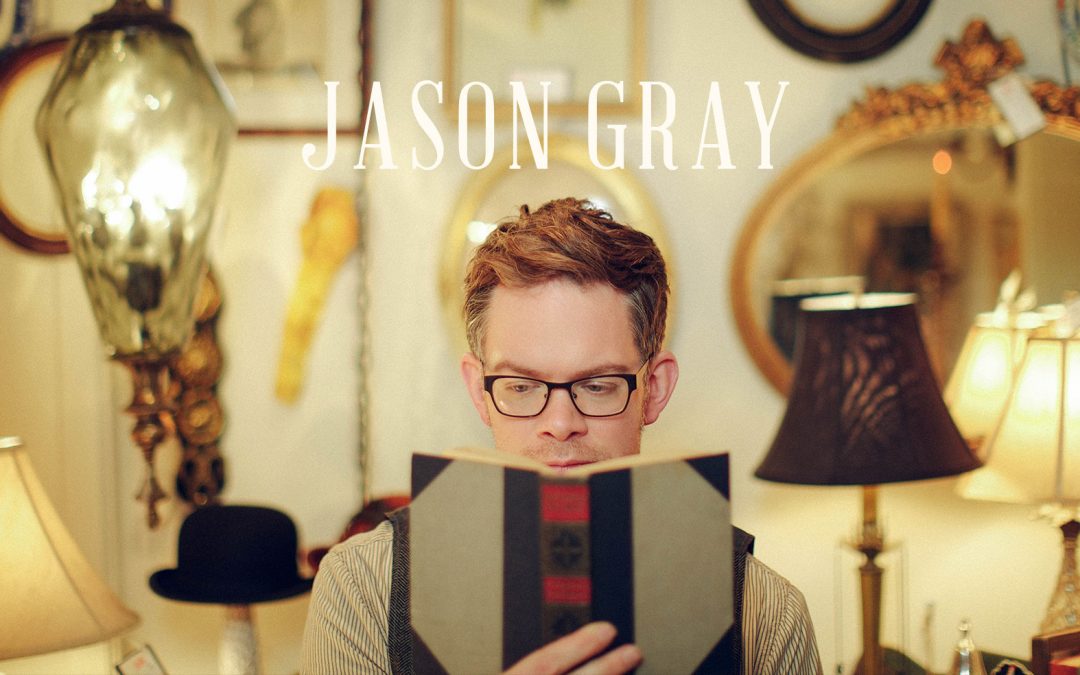 I recently had the chance to interview recording artist Jason Gray, who just released his new album “Where the Light Gets In” on June 17. Rocking God’s House published my review of the album, Why Bono Really Needs to Listen to Jason Gray’s Amazing (and Honest) New Album, on the same day. You can visit Jason’s official website here. And make sure to pick up the new album Where the Light Gets In
I recently had the chance to interview recording artist Jason Gray, who just released his new album “Where the Light Gets In” on June 17. Rocking God’s House published my review of the album, Why Bono Really Needs to Listen to Jason Gray’s Amazing (and Honest) New Album, on the same day. You can visit Jason’s official website here. And make sure to pick up the new album Where the Light Gets In if you haven’t already.
We had a memorable, heartfelt conversation over the phone about the many powerful themes on the album:
 My first question, I just want to hear more about the title of the album, “Where the Light Gets In” and how that really captures the heart of the album for you.
My first question, I just want to hear more about the title of the album, “Where the Light Gets In” and how that really captures the heart of the album for you.
Yeah, a while back I read a quote by the Persian poet, Rumi. He wrote, “The wound is where the light enters you.” That just sounded like one of the truest things I ever heard, you know. It’s actually a theme I’ve explored in a lot of my music, the idea that it’s in our brokenness that things come alive in us. As a person with a speech handicap, I had to learn early on to stop looking for perfection, obviously. I’ve been pressed over the years to talk about it. The verse that says it’s in our weakness that the strength is perfected, and this is an idea we say amen to and are excited about, but we betray ourselves with our language when we say things like, “Hey, you know what? God’s going to use you in spite of your brokenness or in spite of your imperfections.” I think it’s truer to say that He uses us because of our brokenness. Our imperfections. Those become the places where we meet with the Lord most intimately, and they become places of transformation in us. I’ve had a lot of songs address that over the years. I remember reading once that Rich Mullins once said a preacher has one sermon that he preaches differently each week. I do tend to believe each of us is entrusted with some piece of truth that becomes our core message throughout our lives. I would say that’s the message around which all of my work circles and is expressed so succinctly in that quote by Rumi, “The wound is where the light enters you.” When I heard that, I thought, “Oh man, this has to be a song. I have to write this into a song.”
I brought the idea for the song to Dan Haseltine of Jars of Clay, and he resonated with it. I wrote that with him, which is great because he’s one of my heroes. He’s kind and gentle, but it was still very intimidating and I’m trying to be normal.
Right [laughs].
[Laughs] Don’t freak out, just be normal. He’s just a human being, you know. I was so grateful that he brought his beautiful gift to that idea I brought to him. Then, I don’t know if you’ve heard or not, but we just found out about it a couple of weeks ago. Switchfoot has a new record called, “Where the Light Shines Through.”
Oh wow, really? No, I didn’t know that.
The lyric of his song is, “The wound is where the light shines through.” I’m like, “Aw, shoot, we’re using the same stuff.”
You guys are on the same wavelength!
What do you do? Yeah.
Wow. Yeah, what do you do.
At first, I was bummed about it. Then I thought, well, I do think Jon Foreman is one of the most brilliant songwriters and I love his work. I’m a huge fan. How cool is it that we’re reading the same things and having the same conversations?
Yeah, that is really cool. Maybe it will blossom into a friendship someday and lead to something good. I love what you said about how our language betrays us sometimes. I feel that’s been a weakness in the Christian world. [And I struggle with it as much as any other Christian, so I’m not exactly pointing fingers.] But Bono actually had a quote recently. He was talking about the Christian music industry, saying how it did need to be more authentic. I really felt like your album accomplished what he was talking about. I want to get this album to Bono and say, “Hey, here’s the answer to you complaint.” Shifting gears a little: what are some of the ways that God has used this album to encourage you these days?
It’s always a gift to me that I get to make music and get to do it the way I do, get to work with the people I get to work with. Wow. All of that is very encouraging. I hope the album does well so I can keep doing it, you know? I hope the album is received well. It’s been received well so far in reviews and people have heard the new songs. My label is excited about it, so all of that is very encouraging. In terms of the songs themselves, the pattern for me has been so often: I write a song, about three or four years later I catch up to it. I’ll be playing it one night three or four years later and all of a sudden it hits me what the song means.
Wow.
It’s so weird. I wrote the song. I should know what the song means, I wrote it. I thought I knew what it meant. One time, I’ll be playing it on the stage and all of a sudden it opens up to me and it speaks to me in a way I never could have imagined. Very humbling. I have a friend, he’s a songwriter and he says that the songs know what’s going on in us before we do.
[Laughs] That’s great.
Yeah, I’ve had that experience over the years. I think my new album is very optimistic. It’s very hopeful. It’s even happy in some places. I hope that is evidence of the trajectory that my life is on.
It’s as if there needs to be distance between you and the work before it can really hit you. How has your view of your walk with Christ, Christianity, changed throughout this album or this season of your life–if that’s even answerable. I know that’s probably a tough question.
It is answerable, actually. I would say I went through, I’d say, an eight-year struggle in my marriage that ended in divorce. Nobody goes into marriage imagining a divorce is in the future, you know? It’s confusing. It’s painful. It’s the most painful thing I’ve ever gone through. It’s also confusing and disorienting. One of the things that’s confusing about it is my experience, by and large, was always that God came through, even if it was the last moment. He always came through. He’s always been faithful to me. This one thing that I prayed for harder than anything I’d ever prayed for, and tried to make myself available to, was committed to, although very imperfectly. With everything I had in me to give, I hoped. I put my hope in Lord that he would restore our marriage, and it didn’t happen. Something in me broke when that happened. My belief was broken. I didn’t know how to believe anymore. I couldn’t make myself. I couldn’t talk myself into believing. I was just broken. It didn’t work. My prayer was broken. My worship was broken. Then, it’s time to make a new record.
Perfect timing.
Yeah. How do I write about the hope that I’m uncertain of and do it authentically? I had a number of experiences where healing happened bit by bit. One of them was in the midst of writing. I was beginning to write the songs for the new record, and I was out on tour with Big Daddy Weave. This was over a year ago. The divorce was final. I was just a mess. I was just a lump of flesh. That’s all I was. I had bills to pay and I needed to go to work. I go out with Big Daddy Weave. I play four or five songs a night, and then go hide in my bunk. I thought that’s how healing was going to happen. I thought by just hiding away, healing would happen. Big Daddy Weave, I’m not sure if you’ve ever seen them in concert.
I have actually, yeah. [Note to readers: Check out my concert review of a recent Big Daddy Weave/Plumb/Jordan Feliz, complete with photo gallery by pro concert photographer Gerald Pierre.]
Okay. They’re just so kind and generous, and they knew what I was in the midst of. They also do a thing where they do an altar call each night, and people who need prayer come to the front. The artists go down and pray with them.
I remember that, yeah, that was pretty interesting.
I don’t know how to pray for people. I don’t know what I believe. I don’t know if I believe right now. Something in me believes, you know. I don’t know how to do this. I had developed the discipline in my life that if I sense God is moving somewhere, I try to go over there so I might at least get hit by something.
The first night of the tour, they knew that I was broken. They said, “You don’t have to go out and pray.” I said, “Okay, thank you” but then I thought, “Man, if God’s moving there, I don’t want to miss it.” I decided to go down there and pray with people, hoping that nobody who really needed prayer for healing of illness or something wouldn’t come to me, because I don’t think I have what it takes to believe.
That first 11 days of the tour, the first run, every night without anyone knowing my story, anything like that, every night the people who found their way to me, each night there were husbands and wives on the brink of divorce.
Wow! What are the odds?
They asked me for prayer. I just thought, “This is the one thing I know how to pray for.” I know how he feels. I know how she feels. I can pray for this. It felt like, the way I interpreted it at least, it was as though God was saying, “I still have good work for you to do, meaningful work for you to do.” That was the beginning of the healing of my hope and then it was in that season when I began to write for the record.
That’s just amazing, to see God’s hand in all that. Wow.
So I wrote down a bunch of lyrics from your album–some of my favorite lines. Some of my favorites are, “Even the sparrow knows He holds tomorrow.” “Even in the dark I’m saying thank you.” “There’s still life beyond our sin.” “It’s not over even when it’s over.” I guess I don’t have a question, just wanted to share a few of my favorites. There’s a powerful theme running through all of them.
I remember years ago, my pastor said, “The hope of Easter is not for those who are in the waiting room at the hospital hoping that the news isn’t bad, but the hope of Easter is actually for those who have already gotten the worst possible news.” Yet, there is life. There is hope. There is God. A lot of the songs on the album are coming from that place of, yeah, this awful thing happened. The loss is very real, and yet we believe in resurrection. Resurrection of Christ means that we can hope in the resurrection of dreams and all kinds of things that have died, even our heart. A lot of the language reveals that. It’s not over even when it’s over, all that kind of stuff. “Even in the dark, I’m saying thank you.”
I remember somebody saying years ago that a lot of us pray to be like Jesus, but if we really want to be like Jesus, what we have to pray for is that we have enemies. One of the most remarkable things about Jesus was that he loved his enemies. If we want to learn to be like Jesus, we’ve got to learn to love our enemies, and that means we have to have enemies. I think about that, about how these difficult things that we go through, they become our teachers. How will I ever learn to forgive somebody unless somebody wounds me deeply, you know? How do I learn how to have courage unless I’m confronted with something that is terrifying? Eventually, we look back at these awful things we’ve gone through and we are even grateful for them. We can say, “Wow, thank you. I went through that because I learned this and it made me more who I want to be.” I wanted to end the record with that idea, with the song “Thank You for Everything.” It’s one of the few songs of my own that when I hear it, it makes me cry. It actually might be the only song where I’ve had that experience.
***
Check out Jason Gray’s new album and official website here. Also connect with him on Twitter, @jasongraymusic, or on YouTube.



I really enjoyed reading this interview and Jason’s openness on reflecting on his life and songwriting!🎶
Thanks, really glad you enjoyed it!
How about a link to a track to the song, to pitch the album.